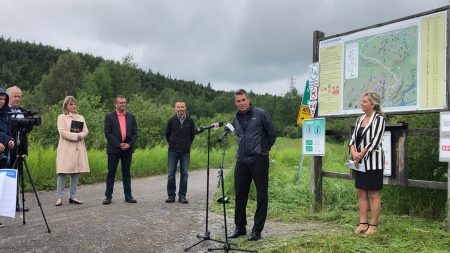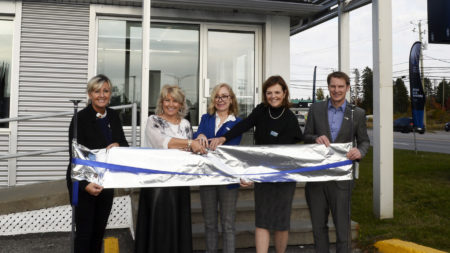Over 120,000 Masks Recycled
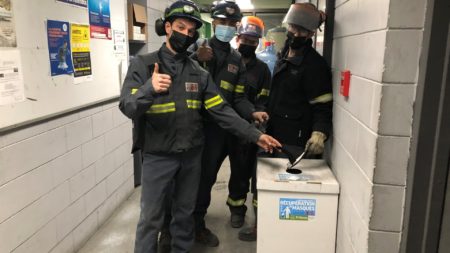
COH Arvida employees
Rio Tinto’s approach to recoverable materials management includes various initiatives for giving scrap and other waste materials a second life instead of sending them to the landfill, thus reducing greenhouse gas (GHG) emissions. So when a group of floor employees asked for a recycling solution for the disposable masks everyone has been wearing these past two years, the Valorisation team accepted the challenge. This led to our collaboration with the regional company Coderr in 2021. To date, nearly 120,000 masks from facilities in the region and community organisations have been recycled.
The reclamation process requires effort and the ability to look beyond the landfill for solutions that do not generate more GHG emissions,” explained François Pelletier Gagné, Manager, Valorisation Team. “I’m proud of what we’ve achieved with this project. As a company, we need to be leaders and take steps to be ahead of the curve and promote eco-responsible actions.”
“Working with Coderr has made this recycling process easier,” Gagné added. “In our facilities, employees were even bringing bags of masks from home. So this initiative has extended beyond our facilities into our families and communities.”
To keep materials out of the landfill, every little thing we do counts,” said Gervais Savard, By-Product Valorisation Coordinator. “In this project, everyone was on the same wavelength—management, unionised employees, contractors and visitors. They all did their part as global citizens to shoulder their social responsibility and act in a way that benefitted the environment.”
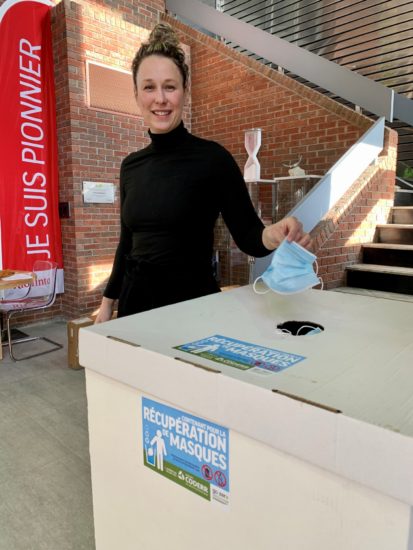
The success of this large-scale project would not have been possible without the contribution of the employees tasked with leading recoverable materials management for each facility. These employees were responsible for implementing the collection system in the various sectors. Éric Desgagné, Supervisor, Work Representative and Recoverable Materials Management Leader 1 at Complexe Jonquière, said, “We were able to collect thousands of masks in the right bins thanks to our managers, who were able to send the message through the ranks. I’m proud of them, and I’m also proud that Rio Tinto decided to invest in this initiative. When the company agreed to it and said it would pay whatever it costs, I was pleasantly surprised. I think that’s the way we need to do things if we want to create a greener planet.”
Dave Gosselin, Assistant General Manager at Groupe Coderr, commented on Coderr’s partnership with Rio Tinto:
Rio Tinto was one of the first companies we worked with to recycle single-use masks. Rio Tinto’s Regional Economic Development team put us in touch with the Valorisation and Procurement teams and contributed financially to the implementation of our mask recycling programme in Mashteuiatsh. From the outset, we could see that the employees were committed to doing their part in this initiative. They have been leaders and have paved the way for other companies to focus on reclamation.”
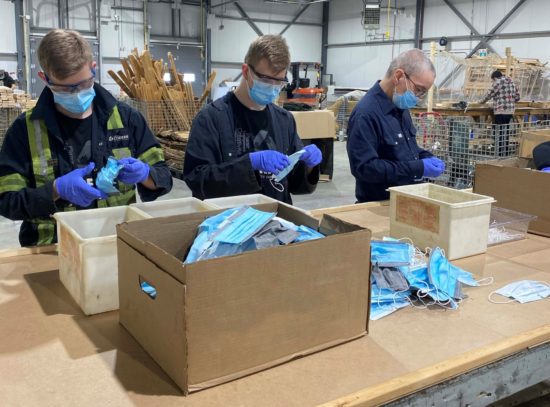
An Initiative that Benefits the Community
In an effort to extend this initiative to the community, Rio Tinto and Coderr partnered to give about 50 community organisations the chance to recycle masks completely free of charge.
It was also important for the team to work with a company that helped to support the community.
This partnership has a mission that is both environmental and social,” explained Josée Gauthier, General Manager of Groupe Coderr. “Since 2019, Rio Tinto has contributed $60,000 to our social integration initiative for the mental health support department. At our facility, we employ 36 people with intellectual disabilities or mental health disorders. This mask recycling programme is a way of indirectly contributing to this initiative.”
Process
Coderr collects used masks from all the facilities in the region to decontaminate them and turn them into plastic beads (raw material used in the manufacture of various recyclable plastic products). Coderr works with Quebec partners to accomplish its mission of optimising the recycling of components so they don’t end up in the landfill or incinerator. The components of the masks (ear attachments, headband, nose bars) are mechanically separated.

